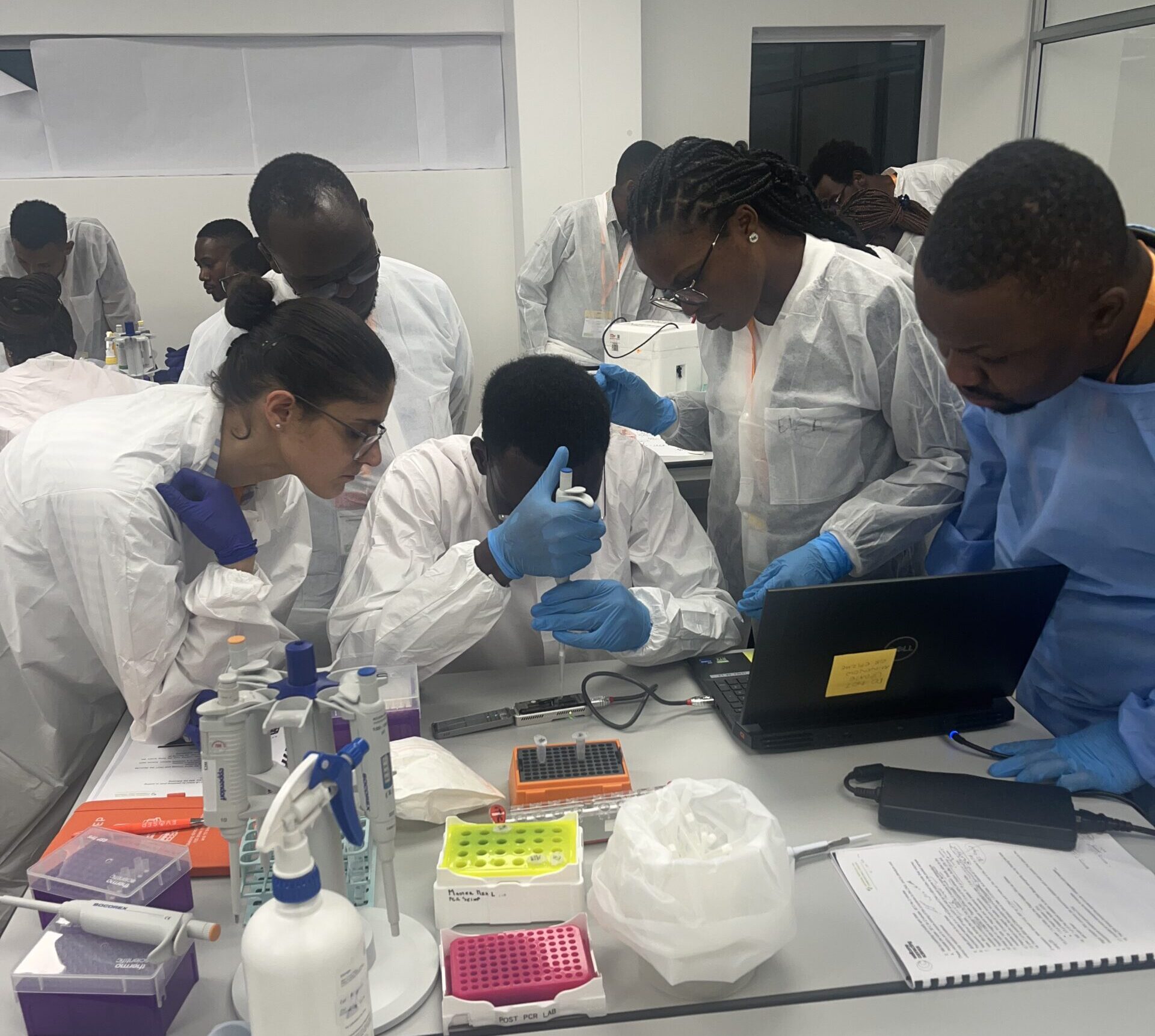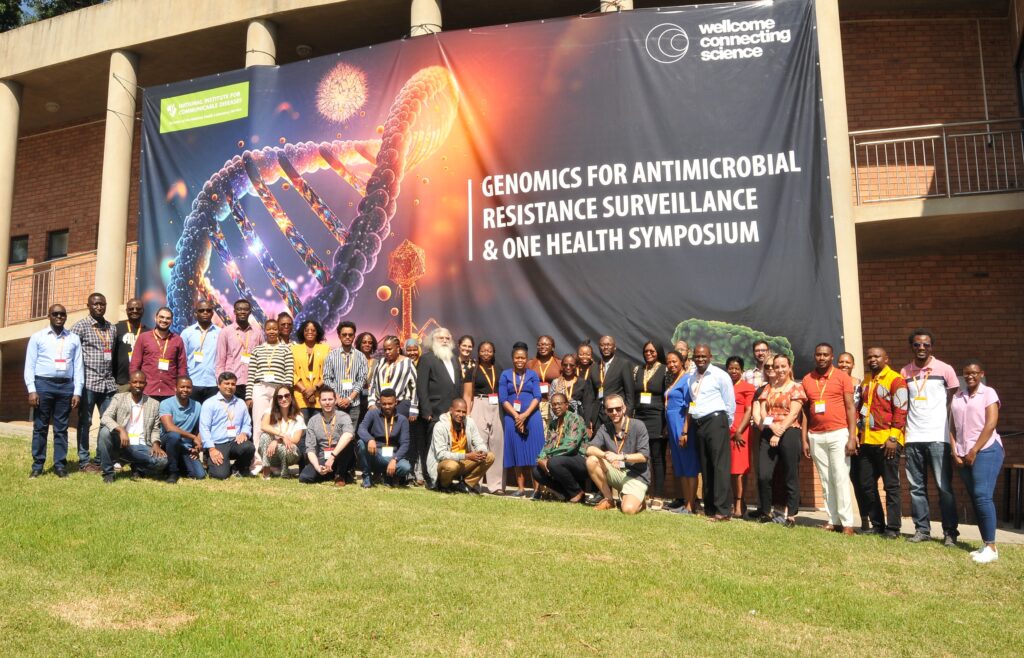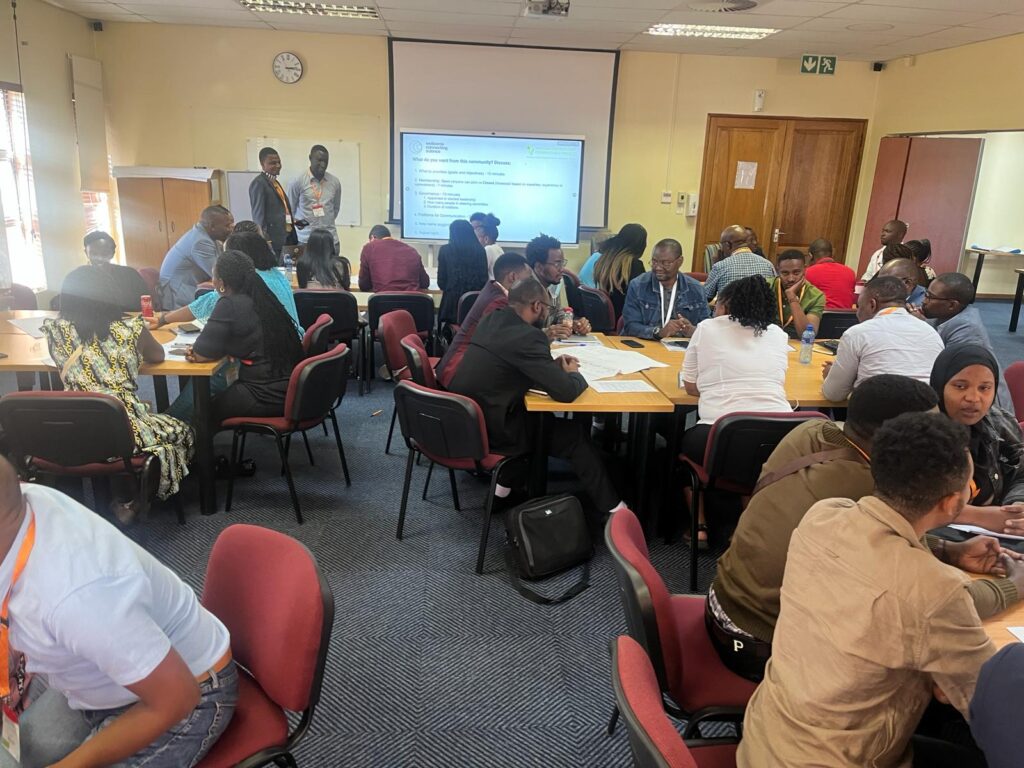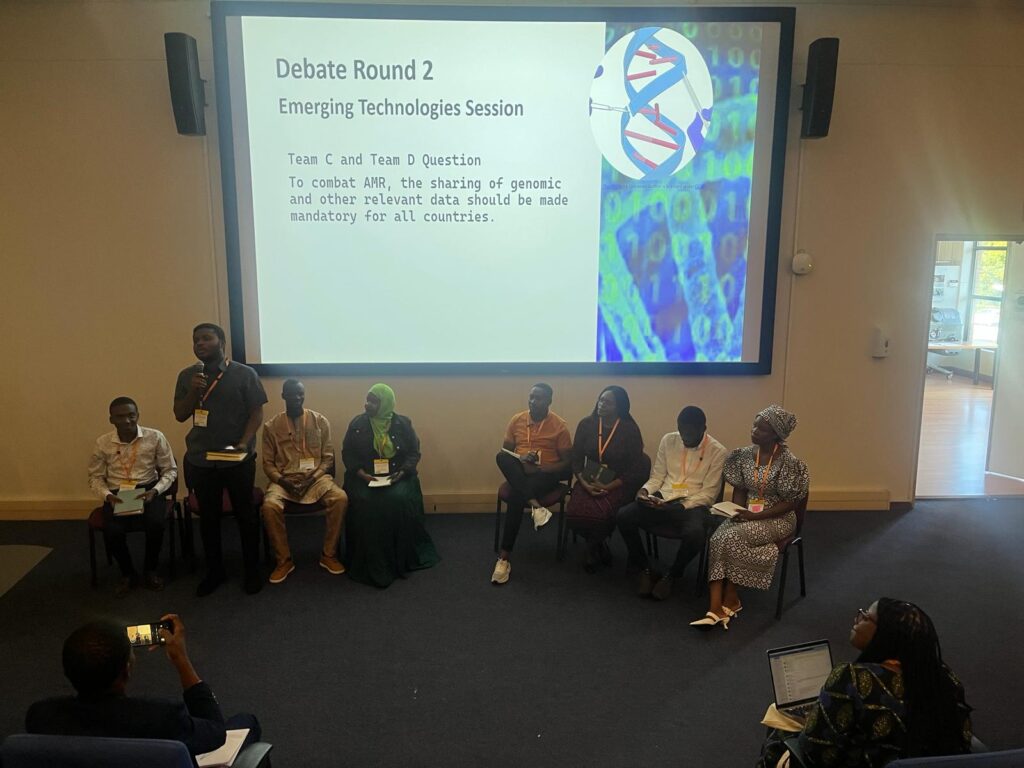
Uniting against antimicrobial resistance in Africa: A collaborative effort to build capacity in genomic surveillance of AMR
A brand new symposium to expand expertise in genomics-based AMR surveillance
Antimicrobial resistance (AMR) poses a serious threat to global health, transcending borders and demanding an international response. There is an urgent need for collaboration between scientists working in human, animal, and environmental health sectors to support the acceleration of genomic surveillance.
To address this challenge, Wellcome Connecting Science (WCS), UK and the National Institute for Communicable Diseases (NICD), South Africa, co-organised the first symposium focused on implementing Genomics for Antimicrobial Resistance Surveillance and One Health.
Together we hosted over 100 scientists from 28 countries, united in their commitment to tackle AMR through the deployment of genomics-led solutions. Scientists were selected from over 1000 applications, demonstrating the appetite for this kind of training.
Scheduled to begin the day after our Antimicrobial Resistance in Bacterial Pathogens course finished, the symposium was designed to provide an environment for trainees to build upon the momentum developed during their training. Over 50 course participants, representing 20 African countries, joined the symposium to explore real-world application of their newly acquired skills and knowledge, to support public health decision making.

Dr Ewan Harrison, a Group Leader at the Wellcome Sanger Institute (WSI) and one of the course organisers, emphasised the importance of the provision of comprehensive training in the end-to-end process of applying genomics to AMR detection and surveillance. This collaborative endeavour opens new avenues for researchers from Africa to collaborate on tackling AMR using genomics.
Participants received training from scientists who came from across the globe. The aim of the course was to provide training across many different aspects of AMR. Firstly, in the experimental methods that are required for detecting resistance, and the importance of quality control in ensuring that data is of a high-quality standard. It also provided training on the basics of genome sequencing for AMR. Participants learnt how to track bacterial pathogens in genes, understand resistance mechanisms, and use genomic data to provide new insights.
Dr Ewan Harrison, Group Leader, Wellcome Sanger Institute
Building critical global capacity
Initiatives that support the translation of knowledge and technical ability into real work scenarios, tailored to regional populations, are vitally important to enhance global AMR efforts.
The symposium that followed the training course, was designed to cultivate a robust pool of expertise in genomics-based AMR surveillance, and foster data-sharing initiatives across the African continent.

During the event, delegates shared their perspectives on the importance of collaborative efforts in tackling AMR and strengthening genomics capacity. Prof Adrian Puren, Executive Director, NICD, underscored the critical role of collaboration in addressing the multifaceted challenges posed by AMR.
AMR is a critical issue for the world, because it has all sorts of implications in terms of treating and managing patients including: prevention, therapeutics and drugs, research and so forth. This is an exciting venture for us to be working with Wellcome Connecting Science. Around 173 countries have developed their programme for antimicrobial resistance, and we are working with the Connecting Science team to ensure these plans are implemented effectively across multiple aspects of antimicrobial resistance.
Prof Adrian Puren, Executive Director, NICD, South Africa
Participant Dr Doreen Shempela, based in Zambia, highlighted the opportunity for African scientists to come together, share experiences, and collectively address common challenges.
I work in a sequencing laboratory back home in Zambia. I have worked with viruses, and they are easy! It’s not complicated like bacteria. Attending this training course helped me to build capacity to manage my work as a person trying to start an AMR programme in Zambia. It also allowed us to network. Not everyone has the capacity to do genomics because it’s expensive, but if we collaborate as African scientists, we will be able to do more genomic testing.
Dr Doreen Shempela, course participant, Zambia
The value of in-person connections
This demonstrates that despite the convenience of online events, there is tangible value in getting together for face-to-face training and symposiums, especially for scientists dealing with a common challenge. Being in the same room sparks connections and conversations that cannot be replicated digitally. It is where ideas bounce around freely, collaborations take root, and lasting relationships are formed.

Building on the success of a virtual community
Following the successful establishment of SAGESA in 2021, a virtual community comprising over 400 scientists based in Africa, the symposium offered the inaugural opportunity for in-person networking and knowledge sharing for its members. This symposium marked a significant milestone in the evolution of SAGESA, transitioning from a virtual platform to real-life interactions. Attendees were able to connect face-to-face: fostering deeper relationships, exchanging insights, and strengthening collaborations.
The symposium served not only as a platform to explore cutting-edge research, but also as a catalyst for critical discussions on data-sharing, governance, and community development. Dr Sylvester Moyo, African Society for Laboratory Medicine (ASLM), Ethiopia, reflecting on the event, emphasised the significance of in-person interactions, citing the invaluable connections made and the accelerated progress facilitated by face-to-face collaboration.

I made key connections at this in-person symposium with representatives from organisations our funders recommended we collaborate with. This opened the door to faster project progress through easier initial informal meetings and discussions around collaboration. I would not have made the same connections had this symposium been delivered in a virtual format.
Dr Sylvester Moyo, African Society for Laboratory Medicine (ASLM), Ethiopia
Reigniting SAGESA
The highlight of the symposium was the collective commitment to formalise the AMR genomics community of practice (CoP). Attendees enthusiastically voted to retain the name SAGESA and outlined clear goals and objectives for the CoP. This landmark decision signifies a shared dedication to fostering collaboration, knowledge sharing, and capacity building in the field of antimicrobial resistance (AMR) surveillance and genomics. By establishing SAGESA as a formal CoP, participants have laid the foundation for sustained engagement, collective action, and impactful contributions to addressing the global challenge of AMR.
NICD and WCS’s collaboration began with the implementation of a network for African scientists interested in genomics application of antimicrobial resistance. During the symposium, members had the opportunity to discuss and decide the future of the network. Click here to discover more about the SAGESA network.
Expanding opportunities across the field
Dr Stanford Kwenda, Lead Data Analyst at NICD, emphasised the symposium’s role in showcasing African contributions to AMR and genomics research, as well as facilitating networking opportunities. By bringing together scientists from diverse backgrounds and regions, the event fostered collaboration and knowledge exchange crucial for addressing challenges and bottlenecks in capacity development for genomics applications in AMR detection and surveillance.
This was an opportunity for African scientists to showcase their work, come together to interact and network around the issues of AMR in Africa.
Dr Stanford Kwenda, Lead Data Analyst at NICD
The symposium exemplified the power of collaboration and in-person engagement in advancing efforts to combat antimicrobial resistance. As global challenges like AMR continue to evolve, collective action and shared expertise remain essential for safeguarding public health and ensuring the effectiveness of medical treatments globally.
The diverse attendees at the course and symposium greatly enriched their experience through active sharing and networking. For many participants, these events represented their inaugural opportunity to interact with world-renowned scientists who have pioneered the development of tools that are now widely employed in the analysis and interpretation of genomics for antimicrobial resistance (AMR) surveillance. This interaction not only facilitated knowledge exchange but also fostered collaboration and inspiration among attendees from various backgrounds and expertise levels.
Dr Alice Matimba, Head of Training and Capacity Building, Wellcome Connecting Science
If you enjoyed this article, you can stay informed about our continued AMR efforts and the full breadth of our learning and training programme, by signing up to our bi-monthly newsletter.
